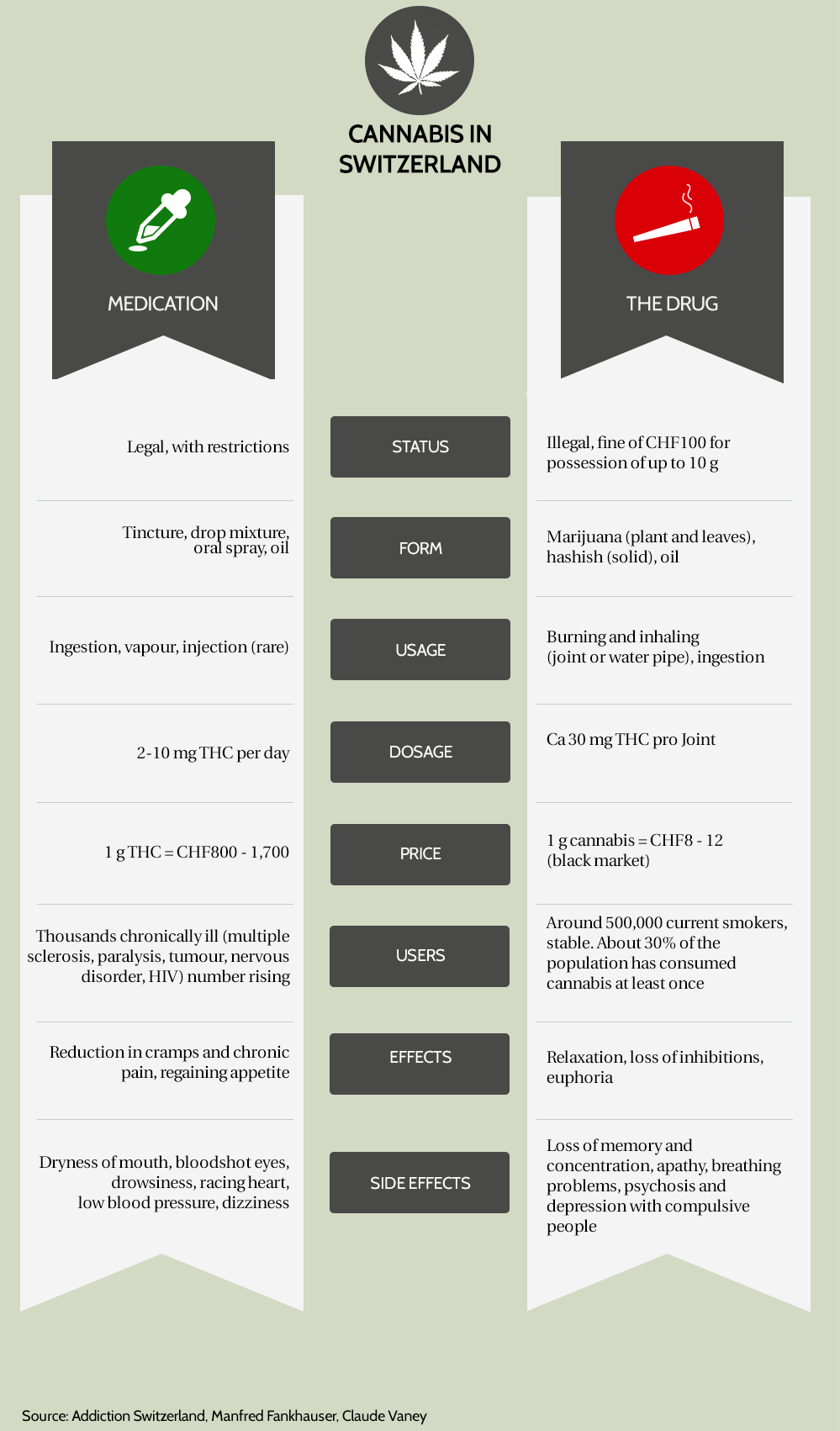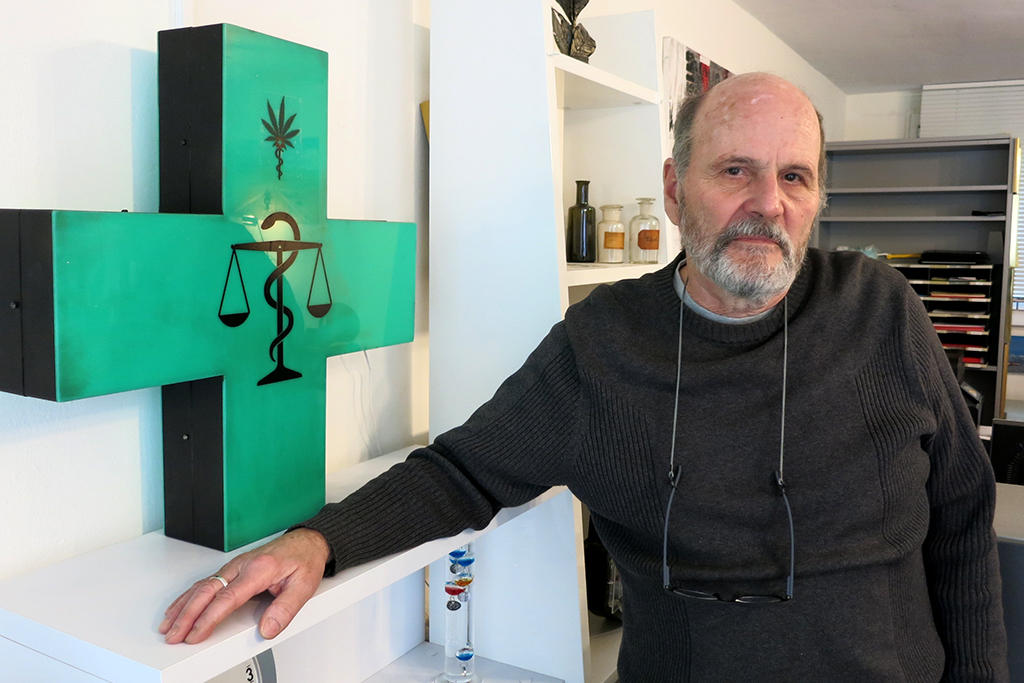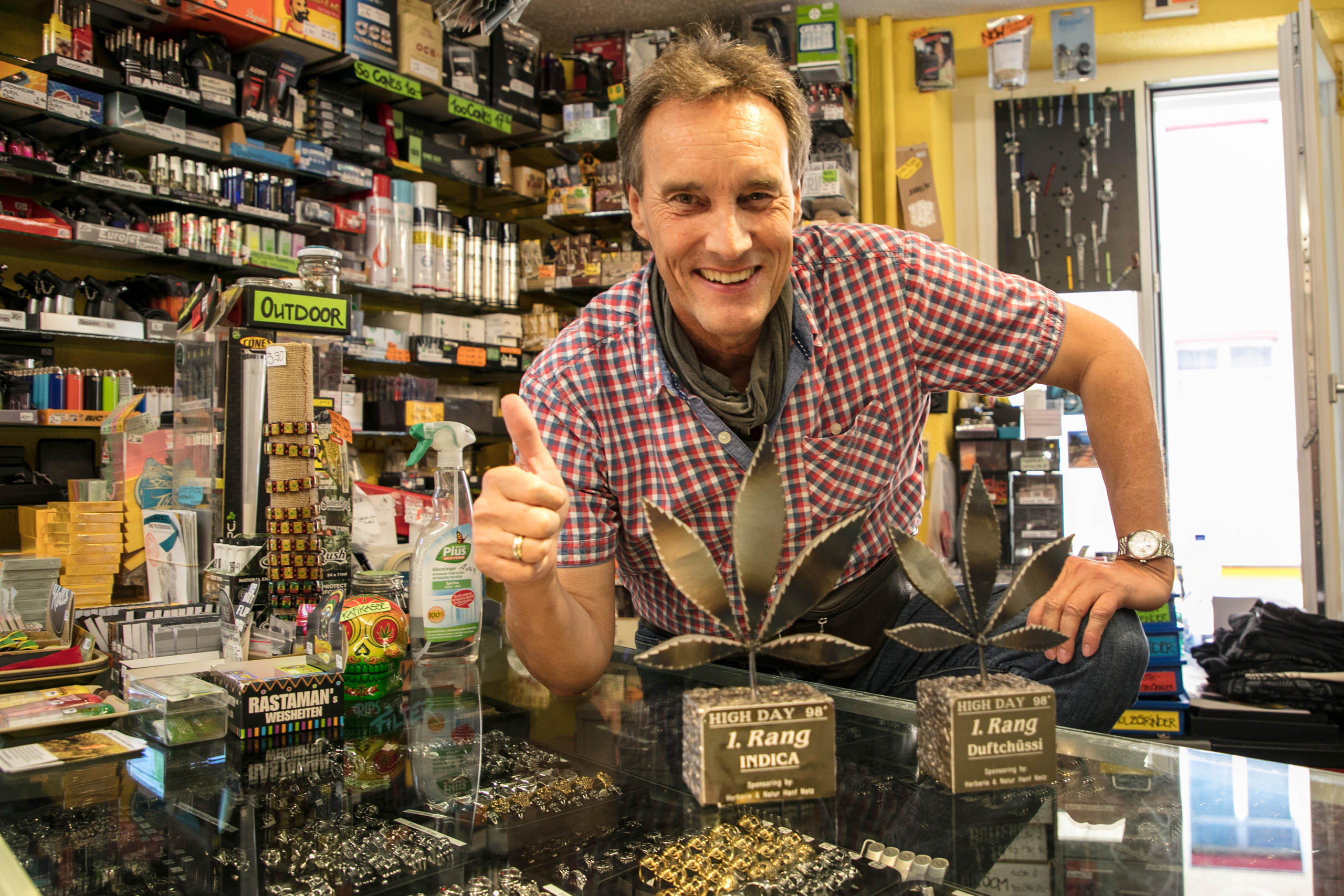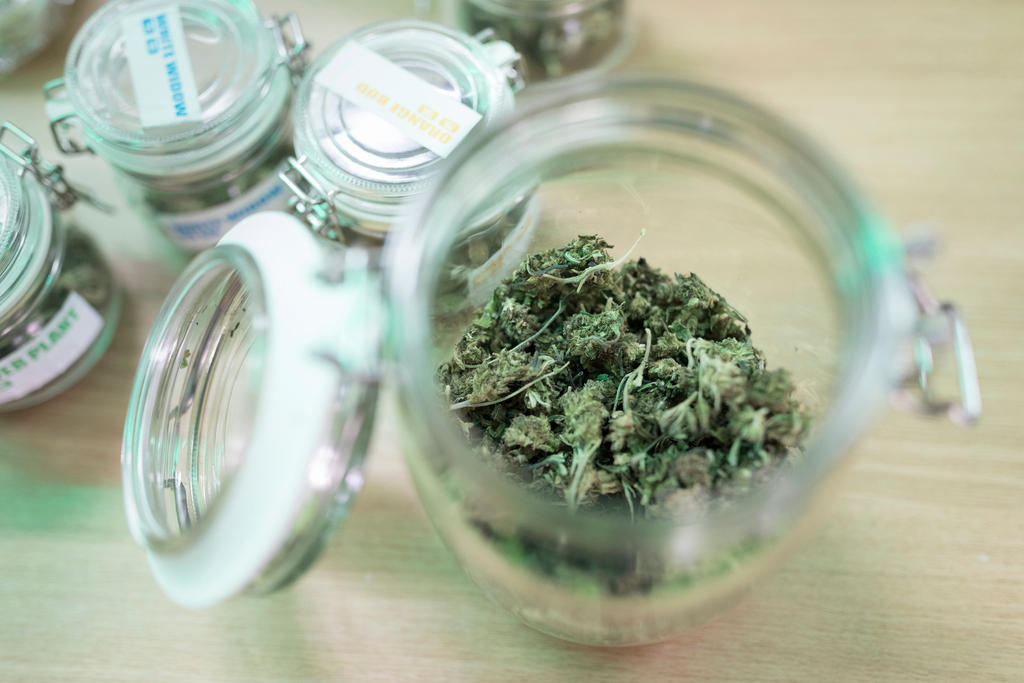‘In three years, medical cannabis could be sold in Swiss pharmacies’

Tens of thousands of patients in Switzerland regularly use cannabis to relieve pain and discomfort. Most of them do so illegally, however. Rudolf Brenneisen, a leading expert on medical cannabis, talks to swissinfo about the current predicament and his hopes to see cannabis on chemists’ shelves.
Switzerland’s national drugs policy is often cited as a pioneering, humane model. Twenty-five years ago, the small Alpine nation launched a project for the medical prescription of heroin and a four-pronged drugs strategy – prevention, therapy, damage limitation and repression. This pragmatic policy, introduced in 1991, was born out of the Zurich drug problems of the 1980s and 1990s.
However, a progressive approach has not been adopted for medical cannabis, says Brenneisen, chairman of the Swiss Working Group on Cannabinoids in Medicine (SACMExternal link) and a former consultant to the United Nations Narcotics Laboratory.
swissinfo.ch: Should cannabis be banned as a drug or legalised as a medicine?
Rudolf Brenneisen: Cannabis is a plant with huge therapeutic potential. A clear distinction must be made between cannabis used recreationally and cannabis for medical purposes, which in my opinion should have been legalised in Switzerland a long time ago.
swissinfo.ch: For what medical conditions or illnesses can cannabis be beneficial?
R.B.: It can reduce muscle spasms for someone suffering from multiple sclerosis, or who has cramps and chronic pain, such as migraine. Laboratory tests suggest that cannabis, and in particular CBD [the active ingredient cannabidiol], helps to fight cancer cells. Cannabis can also reduce epileptic fits.

swissinfo.ch: But what are its side effects?
R.B.: These are usually harmless: a dry mouth, a slight increase in heart rate or a slight dizziness. So far, there have been no reports of damage to internal organs. By contrast, the side effects of aspirin can be more serious. Obviously, depending on the dosage and rate of THC [psychoactive substance tetrahydrocannabinol in cannabis], there may be a psychotropic effect.
swissinfo.ch: It sounds like a miracle remedy…
R.B.: That’s what a lot of patients say, but it’s not. It is not a miracle remedy and it is not a substitute for morphine. We don’t just have to fight the stigmatization of cannabis, but also its glorification.
It is important to talk about its beneficial effects, but we should not conceal the harmful ones. At a recent international congress in Bern organised by SACM, the issue of violent vomiting attacks experienced by some big cannabis smokers was discussed. This is something that has been completely underestimated. It should also be noted that heavy cannabis use by young people can affect brain development.
swissinfo.ch: Is smoking cannabis in a joint an appropriate way of consuming it for therapeutic purposes?
R.B.: For years people have been wondering about the best ways to deliver the active substances into the body. A joint is certainly not what we would advise from a pharmacological perspective, although it is a very common among those who practice self-medication.
Even tablets are not a recommended method, as 80-90% of THC is destroyed by the liver. We must therefore find alternatives. For example, through the mucous membrane of the mouth, the nose or the skin. Currently, the oral spray Sativex is the only cannabis-based medicine approved in Switzerland. New products based on nanotechnology are being developed abroad, which, unlike Sativex, contain all the substances present in the plant. The main challenge is elsewhere, however.
swissinfo.ch: Why’s that?
R.B.: Much of the information available on cannabis comes from studies carried out on a small number of people or directly from patients. But there is a lack of large-scale clinical studies with 100-200 patients.

swissinfo.ch: Cannabis has been around for thousands of years and is widely used in society. Why is research not more advanced?
R.B.: Clinical studies are very expensive. Around €100 million (CHF113 million) has been invested in Sativex. Because of the stigmatization of cannabis, big pharmaceutical companies are afraid of damaging their image, which I find crazy. The fact that there is no patent for a cannabis plant also plays a role. But the industry is very present and there is a lot of competition to introduce cannabis medicines on the market.
Perhaps we should move away from the principles of classic medicines, where everything must be proven, and accept what patients say. In the United States there is an important case involving a child suffering from Dravet syndrome [a type of severe epilepsy] who had hundreds of seizures every day.
A Canadian cannabis pioneer suggested a pure CBD remedy to the parents. The child has not recovered, but his condition has improved significantly, and today he can play sports and go to school. The medicine was approved in record time and will soon be available in Switzerland. It is a success story based on the experience of just one patient.
swissinfo.ch: In Switzerland patients with chronic pain or with serious illnesses are treated with cannabis. What options do they have?
R.B.: The lucky few may have a family doctor who is aware of cannabis’s potential or may not be against cannabis for moral reasons. The doctor must apply to the Federal Office of Public Health (FOPH) for a special permit. This procedure can take 3-4 weeks.
The problem is that only a small number of patients go down this route, which many believe is too complicated. Most of them therefore opt for self-medication, that is, they grow cannabis at home or buy it illegally on the street.
swissinfo.ch: Switzerland is well known for its pioneering drug policy and the controlled distribution of heroin. Why doesn’t the same thing happen for medical cannabis?
R.B.: In the 1990s, everyone was concerned about the drug problems. There were open drug scenes near the Federal Palace in Bern and in the centre of Zurich. The pressures from politicians and the public were enormous; something had to be done.
But there is no such pressure for cannabis. In Switzerland, there are no smokers in a bad state on the streets and the pressure from patients is still low. But it’s only a matter of time. The population and much of the political world are in favour of medical cannabis.
What does the law say?
The cultivation, consumption and sale of cannabis with a THC content over 1% is prohibited in Switzerland (the threshold is 0.2% in the European Union). The new Federal Narcotics Act, which has been in force since 2011, allows for the controlled use of cannabis for medical purposes. But this requires special authorisation from the Federal Office of Public Health (FOPH).
However, this procedure delays the start of treatment and represents “an obstacle to access of treatment”, according to the Swiss government, which intends to facilitate the use of medical cannabis for patients who need it. A draft law on this issue will be presented this summer.
According to the FOPH, between 66,000 and 111,000 people in Switzerland consume cannabis for therapeutic purposes. Of these, only a few thousand have a permit.
swissinfo.ch: The Zurich Association of Pharmacists would like to offer cannabis in chemists, including cannabis for recreational use. Is this the way forward?
R.B.: Medical cannabis should be offered in pharmacies and be managed by competent people. They should not sell the whole flower head of a cannabis plant, which can vary from plant to plant, but identical solutions. Like any medicine, cannabis must also be of high quality. It should not be sold in kiosks or hemp shops, like today with ‘cannabis light’.
But cannabis used for recreational purposes should be distributed in clubs with age restrictions, a membership system and quality control.
swissinfo.ch: Several countries have legalised medical cannabis. What model could Switzerland follow?
R.B.: I don’t think we can follow the American model, where you must be 21 years old to buy cannabis, regardless of its use. The German system, which allows patients to buy cannabis in pharmacies with a medical prescription seems like a good idea. I am sure that within three years this will also be the case in Switzerland.
Ideally, cannabis should be produced in Switzerland to avoid the problems of cross-border transportation. To promote and coordinate research, it would be useful to set up a cannabis institute, like in the Netherlands.
A former colleague who I used to work with at the UN, who is responsible for the narcotics division, told me that Switzerland should continue its pioneering role, like it did for heroin. I often wonder: why not?

In compliance with the JTI standards
More: SWI swissinfo.ch certified by the Journalism Trust Initiative














You can find an overview of ongoing debates with our journalists here . Please join us!
If you want to start a conversation about a topic raised in this article or want to report factual errors, email us at english@swissinfo.ch.